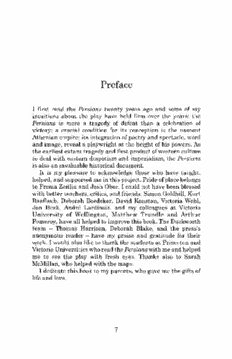
Aeschylus: Persians: Duckworth Companions to Greek and Roman Trag PDF
218 Pages·2006·6.06 MB·English
Most books are stored in the elastic cloud where traffic is expensive. For this reason, we have a limit on daily download.
Preview Aeschylus: Persians: Duckworth Companions to Greek and Roman Trag
Description:
Aeschylus' Persians is the earliest extant Greek tragedy and sole surviving historical tragedy. Produced in 472 BC, the play tells the story of the defeat of the Persian king Xerxes in his attempt to expand his empire by conquering Greece and his return in rags to Persia to face the condemnation of his elders. The first product of the Western imagination to represent the causes and limits of imperialist conquest, the Persians is particularly relevant today. The play is rich in verbal and visual imagery and unflinching in its depiction of the horrors of a defeated invasion and the glory of a successful defence. But the Persians is not merely a paean to Western freedom, democracy, courage and technological supremacy; it is a meditation on the tendency inherent in wealth, power and success to take on a momentum of their own and to push societies to the brink of ruin.This companion to the play provides historical context, thematic discussion, literary and performance history, bibliography and glossary. It is entirely accessible to those studying the play in translation as well as the original Greek.
See more
The list of books you might like
Most books are stored in the elastic cloud where traffic is expensive. For this reason, we have a limit on daily download.
